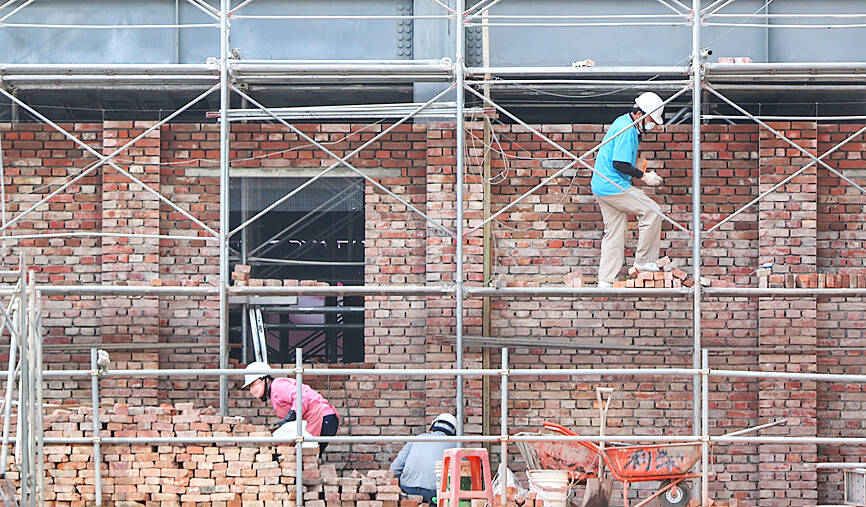Developers in northern Taiwan plan to roll out a record NT$418.24 billion (US$13.65 billion) of new projects for the spring sales season, almost double the volume last year, driven by residential, commercial and industrial properties, the Chinese-language My Housing Monthly (住展雜誌) said yesterday.
Residential projects would generate NT$222.9 billion from sales, or 53.29 percent, while commercial and industrial properties would make up for the remaining sum, the publication’s survey found.
The new high volume is due to the entry of index properties such as the Core Pacific Plaza (京華廣場), a mixed-use property in Taipei’s Songshan District (松山) by Dingyue Development Corp (鼎越開發), an affiliate of China Petrochemical Development Corp (中石化), it said.

Photo: CNA
The plaza would feature four upscale office buildings with 19 aboveground floors and seven basement floors on a 5,000 ping (16,529m2) plot of land on the former site of Living Mall (京華城).
The massive complex achieved Global Real Estate Sustainability Benchmark’s highest recognition for its environmentally friendly design, Dingyue said yesterday.
Taipei posted NT$260.37 billion in property projects from March 29 to the end of next month, it said, adding that projects valued at more than NT$25 billion would be seen in Daan (大安) and Zhongshan (中山) districts.
New Taipei City posted NT$80.63 billion in new projects, with Sanchong District (三重) contributing NT$35 billion, it said.
If plans proceed smoothly, the district could see 40 projects competing for buyers’ attention, making it the city’s most competitive area, it said.
Apartment units priced up to NT$18 million appear in Sanchong, it said.
In Taoyuan, overall sales would amount to NT$44.47 billion, and rezoning areas in Cingpu (青埔) and Gueishan (龜山) districts continue to be the main battleground, it said.
However, there is only one project by Farglory Land Development Co (遠雄建設) that would generate sales of more than NT$10 billion, as most other projects are relatively small, it said.
Hsinchu City and Hsinchu County would see sales of NT$31.17 billion in new projects as developers regain confidence after COVID-19 infections stabilize, it said.
New projects in Hsinchu County are planned in Sinpu (新埔), Hukou (湖口) and Sinfeng (新豐) townships as well as Jhubei City (竹北), it said.
Most developers prefer to stay on the sidelines until the government explains how it would ban transfers of presale house purchase agreements, the publication said, adding that the practice suggests the sales volume for the summer sales season would be huge.

Taiwan Semiconductor Manufacturing Co (TSMC, 台積電) last week recorded an increase in the number of shareholders to the highest in almost eight months, despite its share price falling 3.38 percent from the previous week, Taiwan Stock Exchange data released on Saturday showed. As of Friday, TSMC had 1.88 million shareholders, the most since the week of April 25 and an increase of 31,870 from the previous week, the data showed. The number of shareholders jumped despite a drop of NT$50 (US$1.59), or 3.38 percent, in TSMC’s share price from a week earlier to NT$1,430, as investors took profits from their earlier gains

In a high-security Shenzhen laboratory, Chinese scientists have built what Washington has spent years trying to prevent: a prototype of a machine capable of producing the cutting-edge semiconductor chips that power artificial intelligence (AI), smartphones and weapons central to Western military dominance, Reuters has learned. Completed early this year and undergoing testing, the prototype fills nearly an entire factory floor. It was built by a team of former engineers from Dutch semiconductor giant ASML who reverse-engineered the company’s extreme ultraviolet lithography (EUV) machines, according to two people with knowledge of the project. EUV machines sit at the heart of a technological Cold

AI TALENT: No financial details were released about the deal, in which top Groq executives, including its CEO, would join Nvidia to help advance the technology Nvidia Corp has agreed to a licensing deal with artificial intelligence (AI) start-up Groq, furthering its investments in companies connected to the AI boom and gaining the right to add a new type of technology to its products. The world’s largest publicly traded company has paid for the right to use Groq’s technology and is to integrate its chip design into future products. Some of the start-up’s executives are leaving to join Nvidia to help with that effort, the companies said. Groq would continue as an independent company with a new chief executive, it said on Wednesday in a post on its Web

CHINA RIVAL: The chips are positioned to compete with Nvidia’s Hopper and Blackwell products and would enable clusters connecting more than 100,000 chips Moore Threads Technology Co (摩爾線程) introduced a new generation of chips aimed at reducing artificial intelligence (AI) developers’ dependence on Nvidia Corp’s hardware, just weeks after pulling off one of the most successful Chinese initial public offerings (IPOs) in years. “These products will significantly enhance world-class computing speed and capabilities that all developers aspire to,” Moore Threads CEO Zhang Jianzhong (張建中), a former Nvidia executive, said on Saturday at a company event in Beijing. “We hope they can meet the needs of more developers in China so that you no longer need to wait for advanced foreign products.” Chinese chipmakers are in